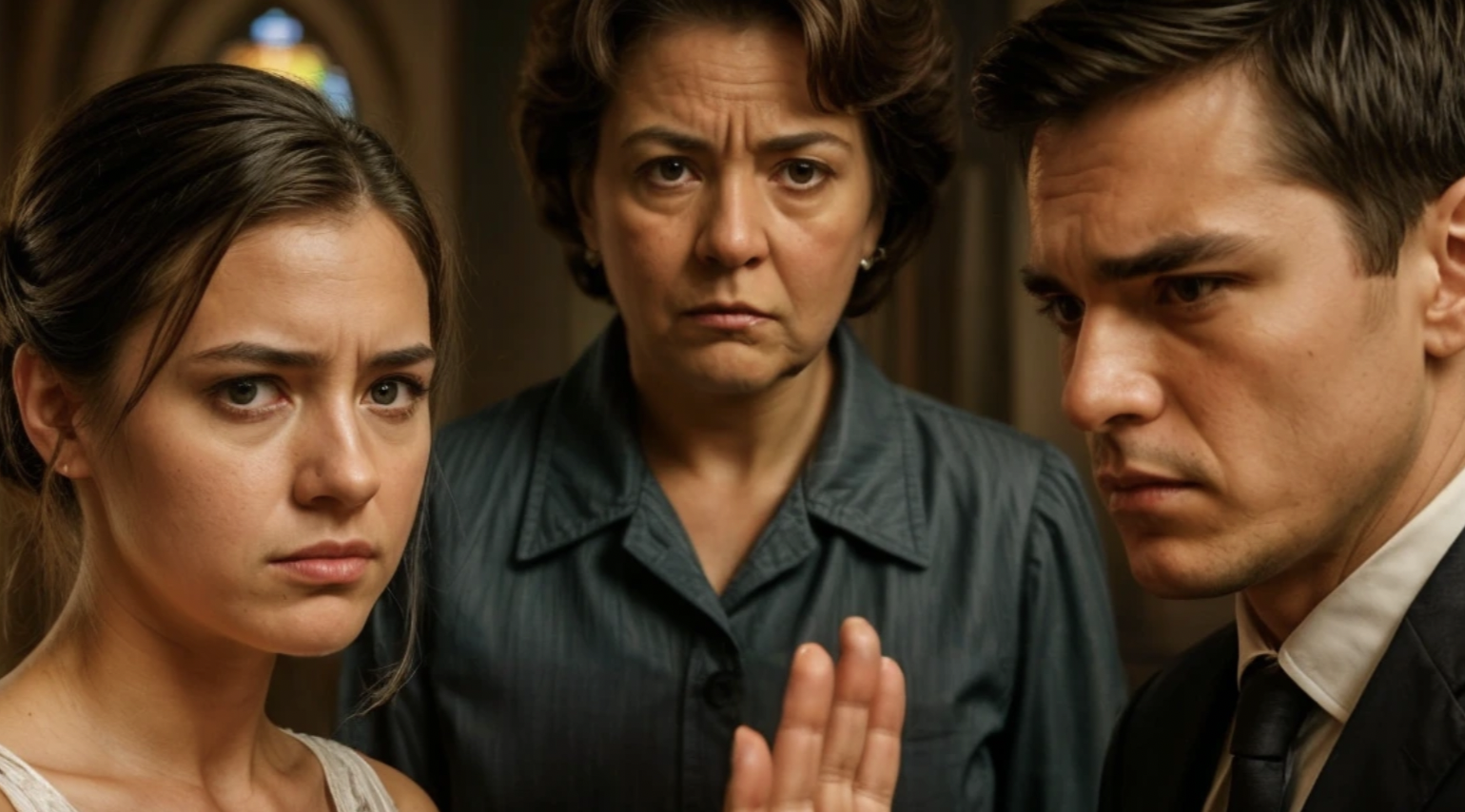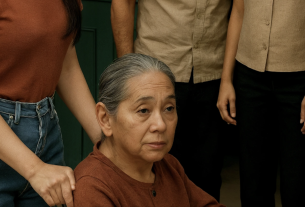I always knew not everyone gets lucky with their mother-in-law. But I never thought I’d one day be speaking of her in the past tense. As if she weren’t a living person, but some historical figure who happened to interfere in my life—so much so that even the miracle of “true love” collapsed like a house of cards.
My name is Anya. I’m thirty-two years old, and at this age, I was sure I could tell the difference between a reasonable person and a tyrant. I’d learned early on to read between the lines, pick up on nonverbal cues. I also used to believe that if a man seemed strong, he truly was. I was wrong.
I met Igor at a mutual friend’s birthday party. He seemed mature, calm, with no visible addictions or emotional drama. Steady job, decent conversation. He didn’t sing me serenades or promise castles in the sky, but he seemed reliable. We dated for six months, and during that time I never saw a hint of immaturity in him. We argued now and then, but quickly made up. He was respectful, always willing to help around the house. In short, I naively believed I’d finally found someone I could build something real with.
I only saw his mother in passing at first—she’d appear in a doorway or in the car when he gave me a ride. A slim, silver-haired, well-groomed woman with permanent makeup and perpetually raised eyebrows. Irina Konstantinovna.
Defined cheekbones, neat makeup, a stern gaze. I did notice her glances were… assessing, but I didn’t think much of it. “She’s probably just cautious, worried about her son.” She would usually toss out a stiff comment like, “Drive carefully, it’s icy,” and vanish. Igor, when she appeared, would become a bit reserved, but tried to maintain composure.
The first real red flag came at a family gathering where I was formally introduced to Igor’s parents as his fiancée. That evening, Irina Konstantinovna suddenly turned to him in front of everyone: “Baby, could you bring the cake?” I blinked: “Baby?” Most men over thirty have a different kind of nickname in the family. He froze, swallowed hard, and went for the cake.
A few minutes later, he came back holding the tray, trying to hide his discomfort behind a smile. I quietly asked him, “Does she always call you that?” He shrugged, like, “Don’t pay attention, Mom has her ways.” It made me uneasy, but I thought—okay, some mothers just can’t see that their sons have grown up. I let it go.
Time passed, and we started planning the wedding. That’s when his mother began inserting her opinions more often: “Why do you need a big gown, Anya? A simple suit would do.” Or, “Better to have a modest church ceremony with fewer people.” I tried to gently stand my ground: “We’ll decide what we want ourselves.” But Igor never supported me out loud. When I suggested a particular restaurant, he’d just say, “Listen, she knows more about this—she’s organized tons of events.” I felt like he and his mom were always in sync, and I was just… on the sidelines. But I didn’t want to back down. I loved Igor and believed—he couldn’t be so dependent that I’d have to fight for his attention.
The turning point was the incident with our guest list. I wanted to invite all our close friends, including my best friend Marta, who was flying in from another country just for the wedding. But Irina Konstantinovna had a meltdown when she heard about her arrival. “That’s not appropriate, we have a schedule, and anyway, I’m handling the list. The bride-to-be doesn’t get to add names on a whim.” Igor mumbled something like, “Let’s find a compromise. Marta can always come later.” I felt like a lump had lodged in my throat. “My wedding. My best friend. And I have to clear it with his mother?!” I nearly had a panic attack from sheer outrage. But I still hoped Igor would fix it.
Day after day, his mother (still technically my future mother-in-law) imposed more “adjustments.” She wanted to replace my makeup artist—“to make you look more decent.” She wanted to cut the guest list—“why invite those girls?” She caused a scene over my ring: “Too big, it’s tacky!” It felt like she was shoving it in my face: “You’re no one, just a tag-along to my son, and I’ll decide how you should live.”
I kept trying to talk to Igor: “Please understand, I need to feel like this is my wedding too. I don’t mind advice, but I can’t stand being disrespected.” He’d grimace: “Come on, who’s disrespecting you? She’s just nagging, ignore it.” But in reality, he simply drifted with her current and preferred to tell me: “Just give in, please, for the sake of peace.”
Then came the final straw. Irina “accidentally forgot” to invite my parents to a family dinner where the wedding menu was being discussed. My mom called, hurt: “Why weren’t we told? We would’ve come!” I was shocked, rushed to Igor. He said, “Mom probably thought your parents were busy and didn’t want to bother them…”
That’s when it hit me: this was done on purpose. A message that she was the one running the show. But I walked right up to her and asked: “Irina Konstantinovna, why didn’t you invite my parents?” She barely looked up from her phone and said sharply, “Well, I figured they wouldn’t be interested. This is just our family logistics.” My heart was pounding like I’d run a marathon. “‘Our family logistics’? So my family doesn’t count?” “Anya, don’t exaggerate,” she sighed with a hint of disdain. “It just happened that way. Next time, I’ll invite them. Or they can ask for the schedule.” I was burning inside, torn between screaming or crying. I turned to Igor: “Did you hear what she said?” He looked away: “I guess Mom didn’t mean to offend anyone…”
That same evening, I made one last attempt to clarify where Igor stood. I said, “If I asked you to uninvite one of your mom’s friends, would that be fair? I want to cut the guest list to make room for my parents since we’re ‘limited’…” He quickly waved me off: “Don’t, that’s too harsh! They’re close to Mom! Don’t go there.” I felt something break inside me. My fiancé didn’t want conflict, didn’t want to upset his mother—and what I felt didn’t matter. I was the third wheel, even though I was supposed to be the bride.
That night, I ran back to my place. Sat on the couch, stared out the window at the city lights, and thought: “I have a choice—either let them both control me, or walk away before signing that paper.” I texted Igor: “Sorry, but this can’t go on. I’m not marrying Irina Konstantinovna’s son. I’m looking for a husband, not a boy on a leash.” Then I blocked him. And her. Maybe it seemed dramatic, maybe selfish—but any other way, I’d have lost myself. Because if you put a man first and he puts you third—after his mother and her whims—what kind of love is that?
The next morning, I went to the bridal salon to return my dress. The saleswoman greeted me politely: “Returning it? May I ask why?” I looked away and said quietly, “Yes. The wedding’s off.” She pressed her lips together: “You looked beautiful in it.” I had no words. Just nodded. Deep down, I understood: outer beauty doesn’t guarantee a happy marriage. How many women had walked out of here with hope—and come back with heartbreak?
From there, I went straight to my parents. My mom hugged me silently. My dad shook his head and said, “Are you sure, sweetheart? We’ve already paid…” I looked at him and knew—yes, losing money hurts. But losing yourself hurts more. Mom gently rubbed my shoulder: “What matters is that you’re okay. Let this be a lesson.” I nodded. I didn’t need comforting words. I’d figured it all out the night before, sitting on my own couch.
A week later, I pulled out the ring I used to think of as my engagement ring. Looked at it closely: just metal, no soul behind the shine. I slipped it on, stared in the mirror. No, that spark was gone. I took it off and laid it on the table. In the reflection, I saw my own eyes—tired, angry. But somewhere inside, there was a flicker of relief. “I guess I made the right choice,” I whispered. And for the first time in a long time, I smiled.
About a month later, Igor tried to reach me through friends. “Let’s talk, it’s all a misunderstanding,” he said. But I saw no point. There’s no “misunderstanding” when a man can’t say to his mother, “Mom, stop. She’s my fiancée. You don’t get to humiliate her.” That’s not an accident. That’s a choice. I didn’t want to return to a triangle where I was the unnecessary angle.
Sometimes I replay those scenes in my head—sitting at their family dinners, his mother preaching that “a woman must forget her own interests for her husband’s sake.” It made me shrink inside, but I was too shy to argue. Now I know—staying silent often creates bigger problems. I should have said from the start, “I’m not like that. And you don’t get to dictate my life.” But sadly, we often realize too late what we should’ve done sooner.
Now I stand at the window, looking at my ringless finger. There’s no ring—and there won’t be, at least not from that family. The thought pulses in my mind: “If you’re always in third place, that’s not a marriage. That’s a bronze medal in someone else’s Olympics.” And I refuse to be the bronze. Yes, it hurts. I wanted something else—I dreamed of love, of family. But I’d rather be true to myself than be an outsider in a world ruled by someone else’s mother, where the “baby” never grew up.
People often ask me: “Anya, do you regret walking away?” I answer honestly: not for a single day. I sometimes think, if I’d married him, I would’ve woken up every morning with that suffocating feeling, knowing I was under Irina Konstantinovna’s control. I’d rather be alone than have to fight for the right to breathe.
And yes, now I only speak of her in the past tense. She was in my life, barging in, barking orders. But anything built on suppression will eventually crumble. And I emerged from it disappointed—but free. And for the first time, I understood just how valuable it is not to hand over your fate to someone else—even if those hands belong to your future mother-in-law or her “baby.”



